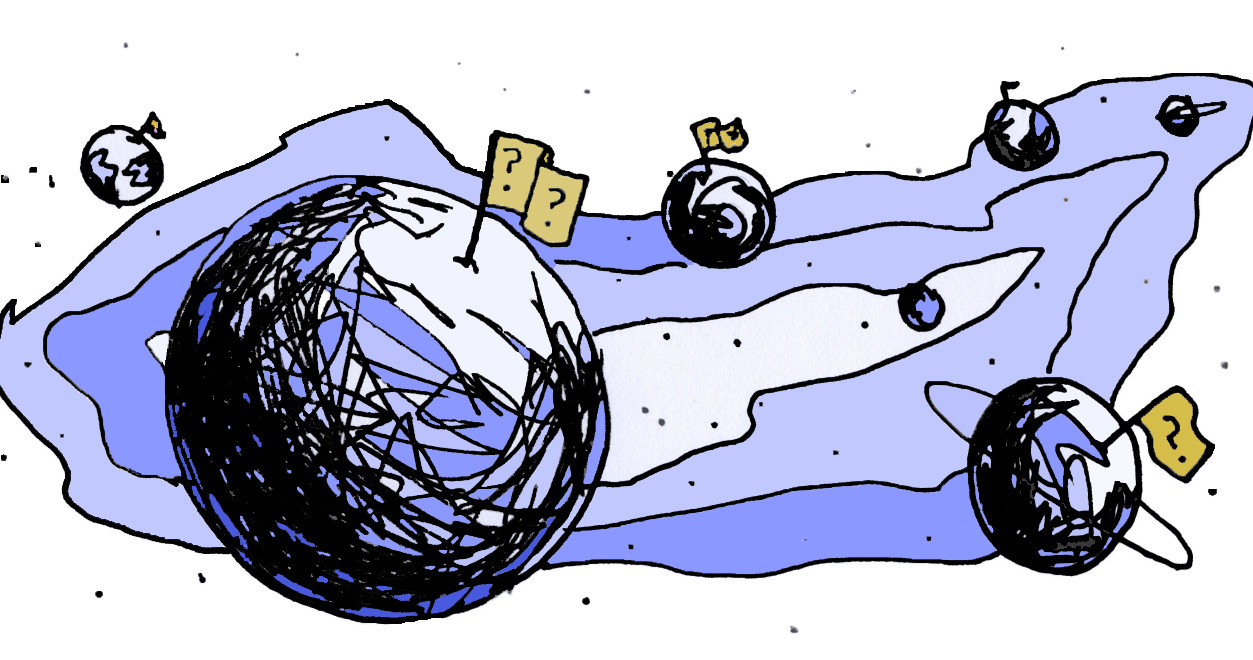Since Sputnik kicked off the space race, humans have steadily littered Earth’s orbit with derelict satellites, spent rocket stages and bits of space projects gone awry. Burgeoning space industries, private and public, only continue to add to the ever-expanding trash. Though growing private markets may provide more opportunities to explore and access space, the deteriorating situation of space detritus threatens everything from DirecTV and GPS to space travel and basic telecommunication. But our skies cannot be cleaned. Half-baked international laws protect the almost one million pieces of defunct space junk by declaring them private property — unable to be removed, except by whoever put them there.
The story of our orbiting pollution puts a unique spin on the tragedy of the commons. At the height of the Cold War, the United Nations created the Outer Space Treaty, which labeled space the common heritage of mankind. However by designating space an unregulated territory, the international community subjected our skies — like our oceans before them — to pollution through free use. The Outer Space Treaty’s insistence on unlimited property rights, by dictating that every artifact in space belongs to its owner indefinitely, has further compounded the space debris problem, because the United States has no right to remove long-useless pieces of Russian satellites — even though their possible collision with US space technology, Gravity-style, poses a major risk. The “let’s clean it up later” mentality of these ill-conceived laws is the heart of the problem: The international community views space, and its debris, as an obscure topic for Trekkies, not as a serious threat that economists and policy makers should address.
But the threat is real. Earth’s satellites orbit our planet at immense speeds. Any collision between existing satellites spews new fragments of space junk into orbit, increasing the probability of future collisions in an effect known as the Kessler Syndrome. The result is an ever-thickening shell of space debris slowly closing humanity off from the skies. The impact of a piece of trash even the size of a sugar cube would cause damage equivalent to a grenade explosion. These aren’t just fear-mongering predictions; collisions destroy roughly one satellite per year, and this number is set to rise dramatically. The US National Research Council now estimates that the Kessler Syndrome has reached a tipping point where collisions will grow exponentially, taking down satellite after satellite and making GPS, telecommunications and scientific research increasingly uneconomical.
Telecom companies currently bear the brunt of the cost. They lose roughly $10 million in future profits every time their satellites must dodge incoming space debris, because such maneuvers waste fuel and decrease the lifespan of the satellite. In 2010, a particularly menacing “zombie” satellite passed through the orbits of several commercial satellites, eating up an estimated $100 million in potential profits. But even though monetary loss could encourage companies to invest in debris clean up, the Outer Space Treaty’s property stipulations eliminates any organization’s incentive to do so, because any such action risks a potentially disastrous diplomatic kerfuffle. In 2009, when a deceased Russian satellite was headed directly towards an Iridium telecommunications satellite, Iridium had no right to attempt to remove the Russian satellite from orbit, and eventually the two crashed, flinging out even more debris.
But space’s tragedy of the commons extends far past the satellites of Earth’s orbit. With groups like SpaceX claiming they will put astronauts on Mars within a decade, the international community should make a second attempt to regulate outer space. Current international law allows organizations to harvest materials from space, but it can’t punish firms that, through malice or negligence, destroy extraterrestrial resources. For example, SpaceX would bear no legal consequences if, in a quest to harvest Titan’s methane, it set Saturn’s orange moon ablaze, crippling the long-term interests of humanity. The international community walks a fine line when considering these hypothetical scenarios. Postponing regulation has only exacerbated the problem by tacitly permitting bad behavior, but enacting premature regulations may be putting the fuel cartridge before the horse, almost certainly leading to unintended consequences that could rob humanity of future opportunities to explore the final frontier.
For now, we must deal with the tragedy spinning around our only home. Most space-faring nations have taken modest actions to limit the accumulation of space debris so as not to exacerbate the situation. France passed a law requiring rocket stages to fall back to Earth after takeoff. NASA outlined practices for limiting orbital debris. The UN created the Space Debris Mitigation Guidelines. Many technologies that could begin clearing the existing pollution from our orbit, such as solar sails, space harpoons or capture nets, exist or are in development, but international law makes such solutions impractical and diplomatically dangerous. Only once international law recognizes space as a finite resource — one that needs to be protected — will we secure our future in the skies.
Art by Maria Paz Almenara.
